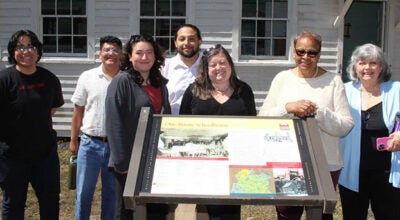ACP stops construction as result of court decision
Published 9:05 pm Friday, December 7, 2018
The U.S. Court of Appeals for the Fourth Circuit granted a stay of implementation of the U.S. Fish and Wildlife Service’s 2018 Biological Opinion and Incidental Take Statement Friday. Dominion Energy, one of the four major U.S. companies with the ACP, confirmed that all work is stopping on the pipeline except for activities in reference to public or environmental safety.
The stay, requested by petitioners Defenders of Wildlife, Sierra Club and Virginia Wilderness Committee was granted pending review by the court, according to documentation from the order filed Dec. 7 by the U.S. Court of Appeals for the Fourth Circuit.
In a case argued in May, petitioners Defenders of Wildlife, Sierra Club and Virginia Wilderness Committee asked the court to seek review of the U.S. Fish and Wildlife Service’s Incidental Take Statement, which authorized the Atlantic Coast Pipeline project to take certain threatened or endangered species. To take, according to a definition by the U.S. Fish and Wildlife Service website, means to “harass, harm, pursue, hunt, shoot, wound, kill, trap, capture, or collect, or to attempt to engage in any such conduct.”
For five of the endangered species included within this authorization, a previous Herald report cited that “The three judge panel found the United States Fish and Wildlife Service’s Biological Opinion required to certify the Atlantic Coast Pipeline did not meet minimum legal standards.”
Aaron Ruby, spokesperson with Dominion Energy, said the company has notified various agencies that the ACP is stopping all work until it hears back from the court, “except for activity needed to protect public safety and the environment.”
In response to the Friday decision, Ruby said the company is in the process of filing a motion for emergency clarification.
“We respectfully but strongly disagree with the court’s decision,” Ruby said. “We believe this stay is not only unwarranted, but overly broad. We are filing a motion for emergency clarification on the scope of the court’s decision. We do not believe there is any basis for the court to stay the entire Biological Opinion, which authorizes all 600 miles of the project. The issues in this case involve a much narrower scope of the project – only four species and roughly 100 miles in West Virginia and Virginia. We will have more clarity on the scope of the court’s stay and its impact on the project when the court responds to our motion.”
The Federal Energy Regulatory Commission (FERC) issued a stop-work order for the ACP in August citing a May 15 ruling by the United States Court of Appeals for the Fourth Circuit regarding the U.S. Fish and Wildlife Service reported failing to set clear limits on threatened or endangered species for the ACP, potentially violating a requirement by the Endangered Species Act.
The U.S. Fish and Wildlife Service issued a new biological opinion that affirmed the project would not jeopardize the existence of more than half a dozen endangered or threatened species in its path. As a result of the biological opinion and after The National Park Service reissued a right-of-way permit to cross beneath the Blue Ridge Parkway between Augusta and Nelson counties, FERC lifted the stop work order in September.
“We believe the Fish & Wildlife Service thoroughly addressed the issues raised by the court and the petitioners in this case when it re-authorized the project’s Biological Opinion and Incidental Take Statement in September,” Ruby said. “In developing this project over the last four years, we have taken extraordinary care to protect the sensitive species at issue in this case. We will vigorously defend the agency’s re-authorizations and the measures we’ve taken to protect the species in oral arguments before the court early next year.”
The ACP is projected to span 600 miles, crossing Buckingham, Cumberland and Prince Edward counties. An air permit for a 53,783-horsepower compressor station in Buckingham is scheduled to be heard at noon Monday. The time was changed from 10 a.m. to noon due to weather concerns related to Sunday’s winter storm and potential delayed opening of State offices in Richmond.





